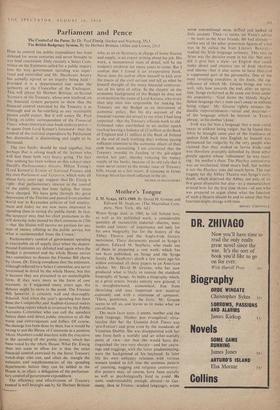Mother's Tongue
WHEN Synge died, in 1909, he left behind him, as well as his published work, a considerable quantity of manuscript material—diaries, note- books and letters—of importance not only for his own biography but for the history of the Abbey Theatre and the Anglo-lrish literary movement. These documents passed to Synge's nephew; Edivard M. 'Stephens, who made use of them in preparing a vast work, which has not been published, on Synge and the Synge family. On Stephens's death a few years ago his widow entrusted all these papers to an American scholar. Mr. David H. Greene, who has now produced what is likely to remain the standard biography of Synge. As befits a biography which. to a great extent, breaks entirely new ground, it is straightforward, economical, free from theorising and uses important new material .copiously and with a minimum of comment. 'These, gentlemen, are the facts,' Mr. Greene seems to tell • us,.and leaves us to make what we can of them.
The main facts were, it seems, mother and ...the Irish language. Mother was evangelical; loyalist (for her the Unionist Irish Times- was 'pro-Fenian')' and prim even by the standards of Victorian Dublin. She was disappointed with her son from both a worldly and an • other-worldly point. of view—not that • she -would -have ,dis- tinguished the two very sharply—and her yearn- ings and naggings, with the latter predominating, were the background of his -boyhood. In later life his own unhappy relations with various Women tended to fall into the -ominous pattern of yearning, nagging and religious controversy;. this pattern may, of 'course, have been socially as well as psychologically hard to avoid. He went, understandably enough. abroad—to Ger- many, then to France=studied languages, wrote
some conventional verse, drifted and looked of little account. Then—it seems, on Yeats's advice —he went to the Aran Islands. He had already— unlike any of the other prominent figures of what was to be called the Irish Literary Revival— studied the Irish language seriously. This visit to 'Aran was the decisive event in his life. Not only did it give him a style—an English that could make direct and creative use of Irish rhythMs and idioms—but it also Seems to have liberated a suppressed part of his personality. One of the most revealing anecdotes in the book, the sig- nificance of which Mr. Greene brings out very well, tells how towards the end, after an opera- tion, Synge exclaimed as he came out from under the anaesthetic: 'God damn the bloody Anglo- -Saxon language that a man can't swear in without being vulgar.' Mr. Greene rightly stresses the double impoverishment—social and doctrinak- of the language which he learned, in Yeats's phrase, 'at his mother's knee.'
Irish was for him a language that a Man could swear in without being vulgar, but he found that When he brought some part of the frankness of spoken Irish back into English he himself was denounced for vulgarity by the very people who claimed that they wished to revive Irish--and was therefore promptly defended by those other _people against whose 'refinement' he was react- ing : his mother's class. The Playboy controversy was an intellectual blind man's buff, but neither it nor the Playboy riots did much harm. The real tragedy for the Abbey Theatre was Synge's early death, which deprived the Abbey not only of its first great dramatist but also—as a memorandum printed here for the first time shOws—of one who was prepared to argue about what the function of such a theatre should be and to admit that that function might change with time.
DONA1 O'DONNELL


































 Previous page
Previous page